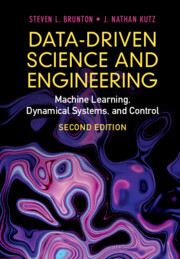Data-Driven Science and Engineering (2nd Ed.) Machine Learning, Dynamical Systems, and Control
Langue : Anglais
Auteurs : Brunton Steven L., Kutz J. Nathan

Data-driven discovery is revolutionizing how we model, predict, and control complex systems. Now with Python and MATLAB®, this textbook trains mathematical scientists and engineers for the next generation of scientific discovery by offering a broad overview of the growing intersection of data-driven methods, machine learning, applied optimization, and classical fields of engineering mathematics and mathematical physics. With a focus on integrating dynamical systems modeling and control with modern methods in applied machine learning, this text includes methods that were chosen for their relevance, simplicity, and generality. Topics range from introductory to research-level material, making it accessible to advanced undergraduate and beginning graduate students from the engineering and physical sciences. The second edition features new chapters on reinforcement learning and physics-informed machine learning, significant new sections throughout, and chapter exercises. Online supplementary material ? including lecture videos per section, homeworks, data, and code in MATLAB®, Python, Julia, and R ? available on databookuw.com.
Part I. Dimensionality Reduction and Transforms: 1. Singular Value Decomposition; 2. Fourier and Wavelet Transforms; 3. Sparsity and Compressed Sensing; Part II. Machine Learning and Data Analysis: 4. Regression and Model Selection; 5. Clustering and Classification; 6. Neural Networks and Deep Learning; Part III. Dynamics and Control: 7. Data-Driven Dynamical Systems; 8. Linear Control Theory; 9. Balanced Models for Control; Part IV. Advanced Data-Driven Modeling and Control: 10. Data-Driven Control; 11. Reinforcement Learning; 12. Reduced Order Models (ROMs); 13. Interpolation for Parametric ROMs; 14. Physics-Informed Machine Learning.
Steven L. Brunton is the James B. Morrison Professor of Mechanical Engineering at the University of Washington and Associate Director of the NSF AI Institute in Dynamic Systems. He is also Adjunct Professor of Applied Mathematics and Computer Science and a Data-Science Fellow at the eScience Institute. His research merges data science and machine learning with dynamical systems and control, with applications in fluid dynamics, biolocomotion, optics, energy systems, and manufacturing. He is an author of three textbooks, and received the UW College of Engineering Teaching award, the Army and Air Force Young Investigator Program (YIP) awards, and the Presidential Early Career Award for Scientists and Engineers (PECASE) award.
J. Nathan Kutz is the Robert Bolles and Yasuko Endo Professor of Applied Mathematics at the University of Washington and Director of the NSF AI Institute in Dynamic Systems. He is also Adjunct Professor of Electrical and Computer Engineering, Mechanical Engineering, and Physics and Senior Data-Science Fellow at the eScience Institute. His research interests lie at the intersection of dynamical systems and machine learning. He is an author of three textbooks and has received the Applied Mathematics Boeing Award of Excellence in Teaching and an NSF CAREER award.
J. Nathan Kutz is the Robert Bolles and Yasuko Endo Professor of Applied Mathematics at the University of Washington and Director of the NSF AI Institute in Dynamic Systems. He is also Adjunct Professor of Electrical and Computer Engineering, Mechanical Engineering, and Physics and Senior Data-Science Fellow at the eScience Institute. His research interests lie at the intersection of dynamical systems and machine learning. He is an author of three textbooks and has received the Applied Mathematics Boeing Award of Excellence in Teaching and an NSF CAREER award.
Date de parution : 05-2022
Ouvrage de 614 p.
18.3x25.9 cm
Thème de Data-Driven Science and Engineering :
© 2024 LAVOISIER S.A.S.
